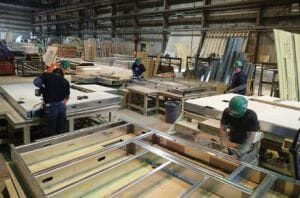MODULAR COMMERCIAL BUILDINGS: GREENER AND FASTER
Modular Construction is greener than conventional construction
Modular construction is better for the environment than conventional construction in a number of different ways.
Less waste
Repetitive production is more efficient than one-off production. A large-scale, repeatable process reduces waste because it’s honed to maximum efficiency. The controlled environment of a factory also means there less damage to materials due to moisture, and there’s a lower risk of theft and vandalism. It’s much easier to maintain security at a permanent location and with consistent staff, than it is at a temporary outdoor site with a constantly changing workforce.
More recycling
There’s more opportunity for re-use and recycling in a factory environment. Scrap wood from one project can easily be used in the next, for example. Relocatable modules are designed to be re-used in a different location
Less transportation
Modular construction involves fewer transport activities. Workers travel to the factory and stay there for each workday. All the materials they need are already in the factory, so there’s no need for repeated trips to get supplies.
Less site disturbance
Imagine building a lakeside hotel. With conventional construction, an ecologically sensitive site like this could be disturbed every workday for two or three years. Modular construction causes much less site disturbance because most construction takes place in the factory. Setting the modules in place and joining them together at the site is a relatively brief task. During construction, there’s also less noise pollution from an enclosed factory than from an exposed construction site.
Less energy
Modular construction uses less energy partly because of the reduced construction time. Because it takes less time to construct a building, less energy is required for heating, lighting, etc. during construction.
In the longer term, though, lower energy usage is also an effect of the higher quality construction that’s possible in a factory. Dr. Zhen Lei, Assistant Professor and OSCO Research Chair in Offsite Construction at the University of New Brunswick’s Off-Site Construction Research Centre says, “The sound building envelopes that the modular construction approach brings help reduce building energy consumption in the long run, especially in a cold climate such as Canada.”
Modular construction is faster than conventional construction
There are three main reasons that modular construction is faster than conventional construction.
Simultaneous construction work
With modular construction, there’s no need to wait for a foundation to cure before starting to construct hotel rooms, for example. The hotel room modules can be manufactured at the factory at the same time as the site is prepared and the foundation is poured and cured.
Fewer delays
According to an article in Cost Engineering, “Adverse weather has a significant impact on the productivity of many construction tasks, and accordingly is considered one of the main factors causing delays and cost overruns on construction projects”. A factory doesn’t have to stop manufacturing due to bad weather. In addition, because security is easier to maintain at a factory than at a temporary outdoor construction site, there will likely be fewer delays due to theft and vandalism.
Fewer change orders
According to a National Institute of Building Sciences report, “Compared with traditional construction, PMC [permanent modular construction] projects have statistically fewer change orders, which makes the design/construction process go smoother and faster.”
Because modular construction is faster, buildings can be occupied sooner — which means a faster return on investment.
---------------------------------
Zena Ryder is a Freelance Construction and Healthcare Writer. You can find her at Zena, Freelance Writer.
This is an online exclusive article.
